Coastal Steward Volunteer – Laurie Lyng
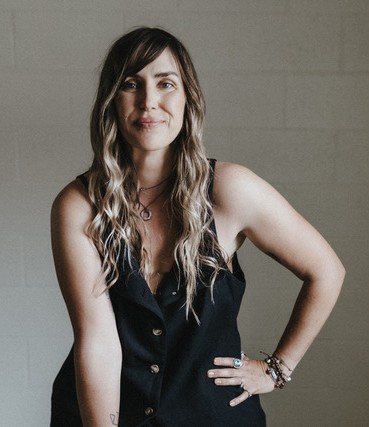
Laurie Lyng is the founder and leader of the Sea Pines Beach Clean Up Crew, an official Texas Adopt-a-Beach group focused on protecting the Coastal Bend’s beaches through monthly cleanups and youth-led conservation. What began in 2022 with just three neighborhood kids has grown into a movement of nearly 100 online members and 20+ youth volunteers, with families actively participating in hands-on beach restoration.
Her mission blends environmental action, youth empowerment, and community education. Using digital tools like YouTube (26K followers) and social media, Laurie shares educational content, cleanup highlights, and coastal science in collaboration with experts like Padre Island National Seashore. She’s also introduced drone technology to improve cleanup efficiency and connects youth to leadership programs like the Young Texan Ambassadors.
Laurie has partnered with organizations such as H-E-B’s Our Texas, Our Future, Keep Texas Beautiful, and Coastal Bend Bays Foundation, leading efforts like the Trash Free Gulf event, where her team removed 195 pounds of debris, and major cleanups after public events like Barefoot Mardi Gras.
Through innovation, consistency, and community partnerships, Laurie has created a sustainable, youth-driven model of environmental stewardship—educating hundreds, restoring local habitats, and inspiring the next generation of conservation leaders.
Coastal Steward Professional – Leslie Earle Albrecht
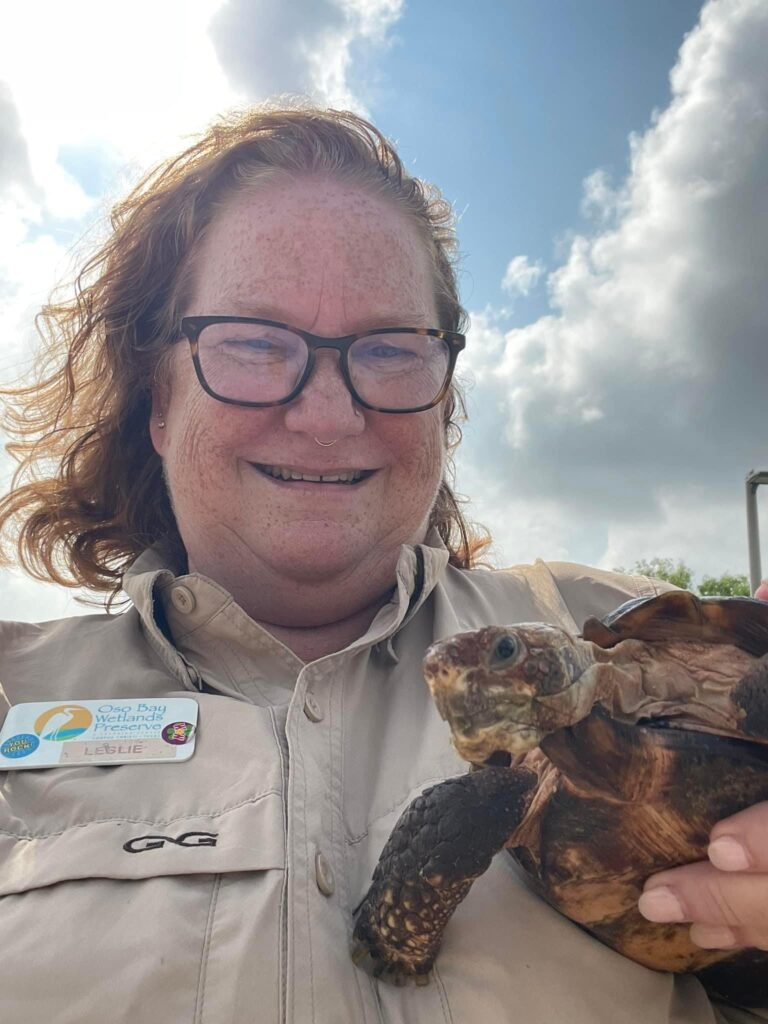
Leslie Albrecht has been a transformative leader in advancing environmental stewardship across the Coastal Bend through her role as Environmental Education Coordinator at the Oso Bay Wetlands Preserve & Learning Center. Beginning as a volunteer, Leslie’s passion and vision have grown into a dedicated career, spearheading inclusive, community-centered programs that make environmental education accessible, creative, and deeply impactful.
Leslie’s innovative approach blends science, nature, and recreation to engage diverse audiences of all ages. Her programs include guided nature walks, volunteer service projects, sensory play days, early childhood classes, TEKS-aligned field trips, and community events—ensuring that every visitor finds a meaningful way to connect with the natural world. Signature programs like Toddler Tracks and Nature Story Time introduce young children to nature in safe, engaging settings, while Porch Talks and art-based events such as Crafternoon and Craft Time: Diamond Art draw in adults and those less inclined toward traditional science education.
Under Leslie’s leadership, 2025 marked a record year for program attendance at the preserve, leading to the expansion of sessions and the launch of Toddler Tracks to meet increasing demand. Children and families constitute approximately 65–70% of attendees, fostering early and lasting connections to nature. Remarkably, Leslie more than doubled field trip participation from 2024 to 2025, dramatically expanding the preserve’s educational impact.
Leslie’s work has created a thriving volunteer program open to all ages and fosters partnerships with local schools, Scouts, Texas Master Naturalists, churches, and community organizations—ensuring programs are well-resourced and deeply relevant. Many repeat attendees become volunteers, advocates, and leaders themselves, generating a self-sustaining cycle of environmental stewardship.
Her immersive teaching style turns everyday experiences into “teachable moments,” whether exploring dried wetlands, organizing litter cleanups, or removing invasive species like guinea grass. These hands-on lessons leave lasting impressions that inspire participants to become active conservationists.
Through creativity, consistency, and deep community engagement, Leslie has transformed the Oso Bay Wetlands Preserve into a dynamic hub for environmental education and lifelong advocacy. Her work nurtures a new generation of stewards and builds a culture of conservation that will benefit the Coastal Bend and beyond for years to come.
Coastal Community Group – Kathryn Tunnell, Up2U Litter Prevention Program
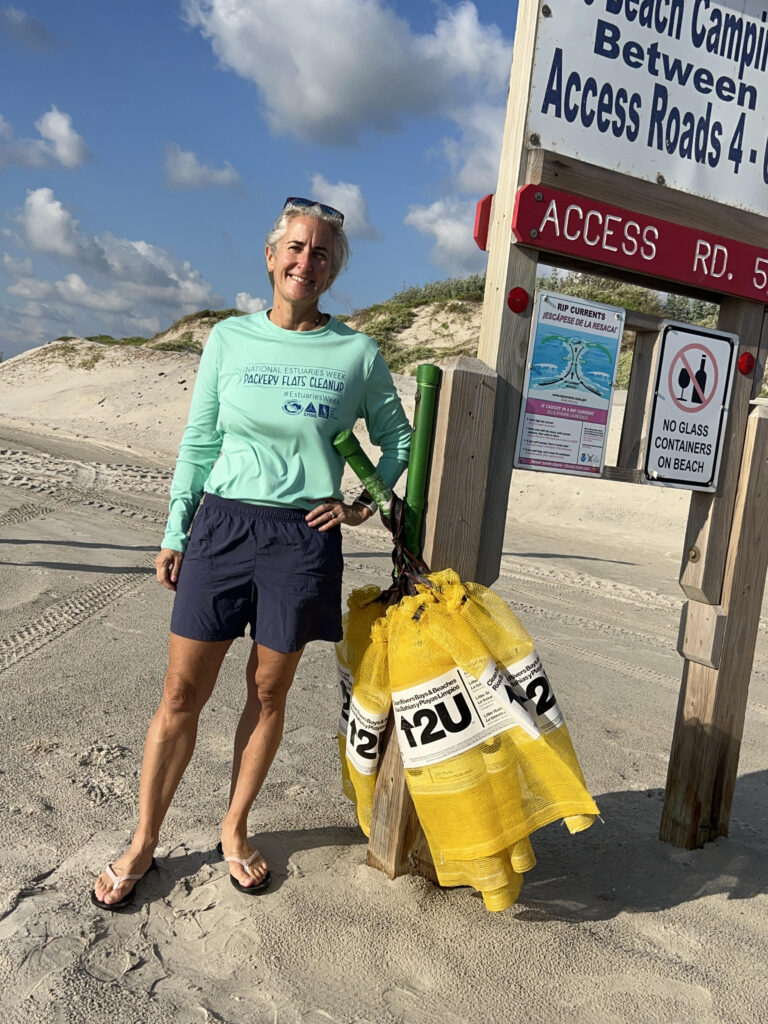
Kathryn Tunnell leads the innovative Up2U Program through the Coastal Bend Bays & Estuaries Program, empowering communities across the Coastal Bend to reduce litter along the Texas coast. The program centers on a bright yellow mesh litter bag marked with the “Up2U” message, serving both as a practical cleanup tool and a symbol of personal responsibility.
Over the past five years, more than 150,000 bags have been distributed to partner organizations and community members, creating a highly visible and ongoing presence that reinforces environmental stewardship. Kathryn’s leadership combines hands-on litter removal with behavior-change messaging, addressing both the symptoms and causes of litter pollution.
Kathryn has built a broad network of partners—including local organizations, schools, and volunteer groups—who use the bags in coastal cleanups and everyday litter prevention, making participation accessible and impactful. She has overcome logistical challenges in distributing tens of thousands of bags across a large region by developing efficient partnerships and communication strategies.
Funded by the U.S. Environmental Protection Agency, the program is designed for long-term sustainability. Communities using the bags become advocates, spreading litter prevention messages beyond the initial project scope. Kathryn ensures the program’s environmental and educational goals are met through hands-on management.
Education is central to Up2U: each bag carries a message that prompts reflection on individual responsibility. Kathryn has created outreach materials and partnered with schools and volunteers to raise awareness of how litter harms coastal ecosystems, wildlife, and community quality of life. Through public events, cleanups, and bag distribution, she transforms simple cleanup efforts into meaningful educational experiences that inspire lasting environmental responsibility.
Business – Texas Floating Classroom, Captain Bryan and Whitney Curry
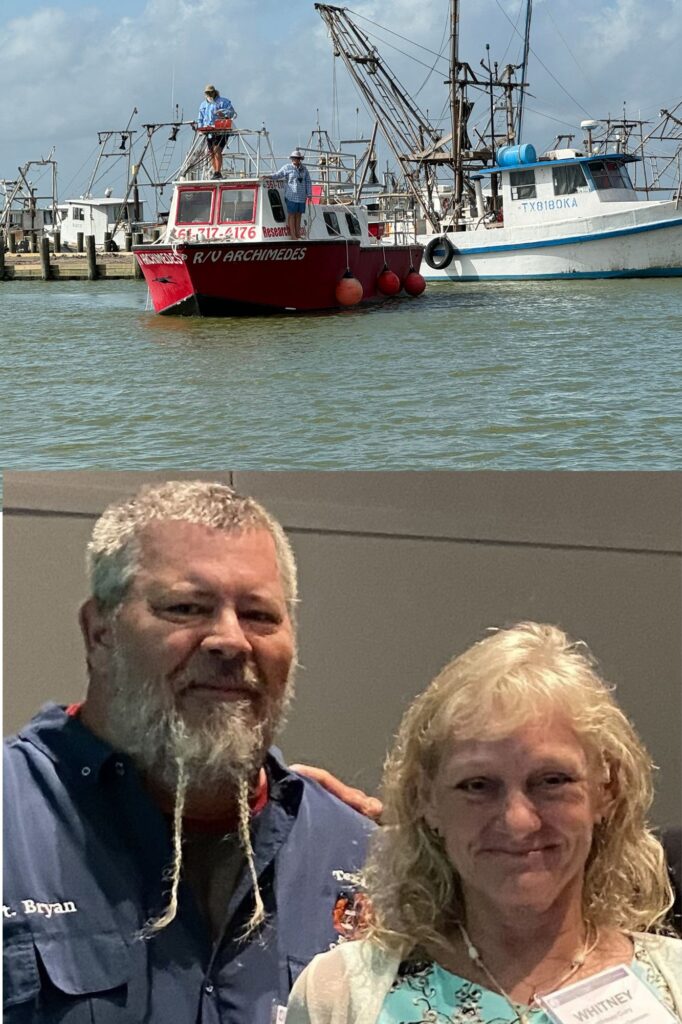
Whitney and Bryan Curry, captains of the RV Archimedes, educate students across South Texas about marine life and the importance of caring for the environment. They conduct marine ecosystem classroom activities aboard the RV Archimedes, giving students hands-on field experience with marine organisms and tools like trawl and plankton nets. The Currys also bring touch-tank critters inland, setting up interactive displays at schools to deliver the same environmental lessons.
Using their “floating classroom” and land-based programs, they have spent many years teaching thousands of students about the connection between marine life and human actions. Whether on the water or in a classroom, their message is clear: we all live in the same watershed, and we all share the responsibility to protect it. By helping students fall in love with marine creatures, they inspire a lifelong commitment to keeping our waters clean.
Coastal Steward Educator – K-12 – Steve Dial, Flour Bluff Junior High School
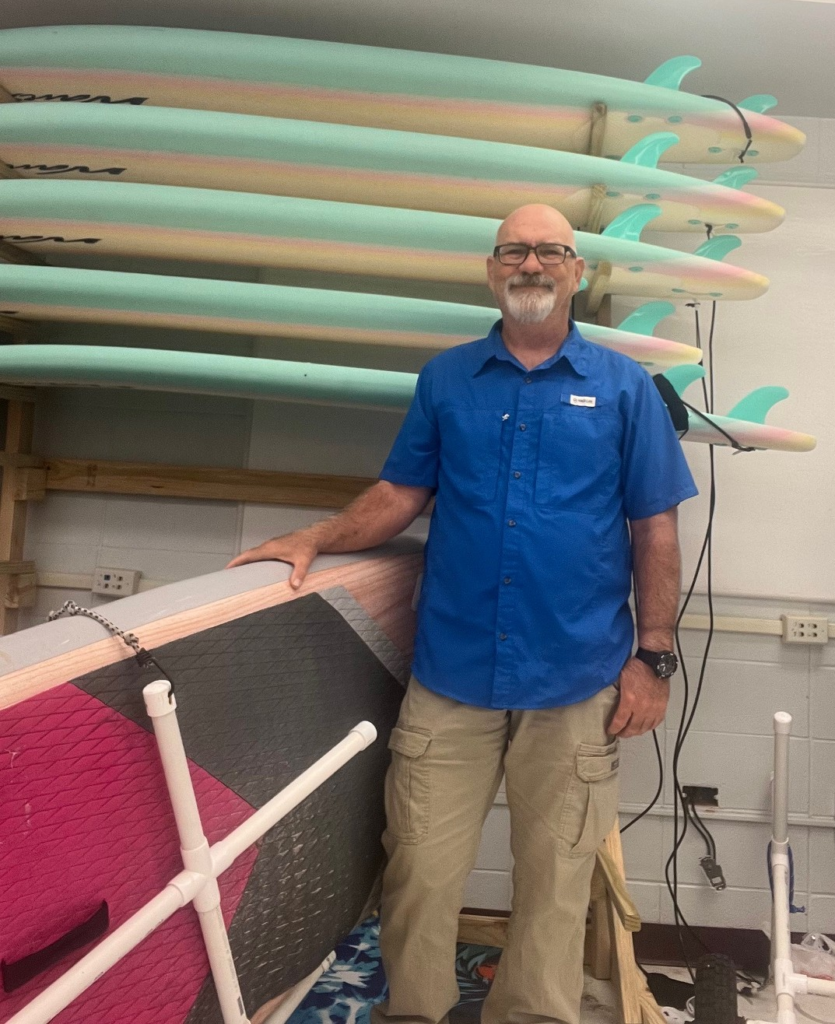
Steven Dial, a teacher at Flour Bluff Junior High, leads the Coastal Explorer program and Wetland Ambassadors at Flour Bluff ISD, using hands-on field experiences to teach marine science, ecology, and environmental stewardship. His students participate in frequent trips to places like Packery Jetties, the Texas State Aquarium, and the TPWD hatchery, reinforcing real-world lessons in sustainability and conservation.
The program shows measurable academic and behavioral benefits. Wetland Ambassadors, selected for their engagement, maintain higher GPAs, demonstrate strong leadership, and often earn honors like NJHS membership, athletic roles, and internships with Texas A&M–Corpus Christi. Notably, three former students are preparing a scientific paper for publication.
Dial’s approach includes guest speakers such as game wardens, seasonal virtual “hunts,” and active participation in local cleanups and events. His passion for coastal ecology and student-led advocacy makes him a role model for both students and educators.
Coastal Steward Educator – Higher Education – Dr. Jennifer Pollack, Texas A&M University-Corpus Christi, Harte Research Institute
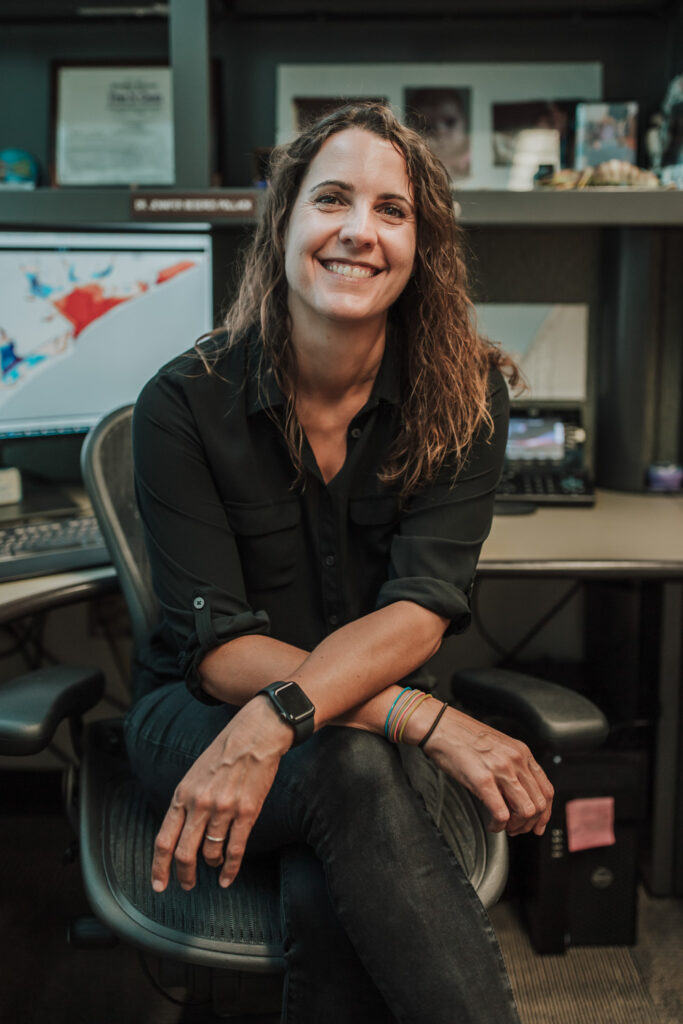
Dr. Jennifer Pollack co-founded the Sink Your Shucks program in 2009, a pioneering oyster shell recycling initiative that partners with local and regional seafood restaurants to collect used oyster shells and return them to Texas bays to rebuild oyster reefs. This process supports fish and shellfish habitats, improves water quality, helps prevent shoreline erosion, and sustains the commercial oyster fishery. Before this effort, millions of pounds of oyster shells were discarded annually, disrupting reef regeneration.
Since its launch, over 3 million pounds of oyster shell have been reclaimed and used to restore more than 45 acres of oyster reef habitat. Each year, over 400 volunteers participate in shell-bagging events that not only help rebuild reefs but also engage and educate the community. Through outreach efforts, the program reaches over 5,000 people annually, raising awareness about oyster conservation.
Dr. Pollack also plays a significant role in shaping state oyster policy. Appointed in 2019 to the Texas Oyster Task Force, she has since served on three additional Texas Parks & Wildlife committees: the Coastal Resource Advisory Group, Oyster Regulations Working Group, and Oyster Restoration Working Group. Her expertise has been key in guiding oyster harvesting and restoration policy across the state.
As a professor, Dr. Pollack has also contributed to academic development, having trained 7 Ph.D. students, 22 M.S. students, and 19 undergraduate researchers, further extending her impact on marine conservation and education.
Non-Profit Organization – Majesty Outdoors
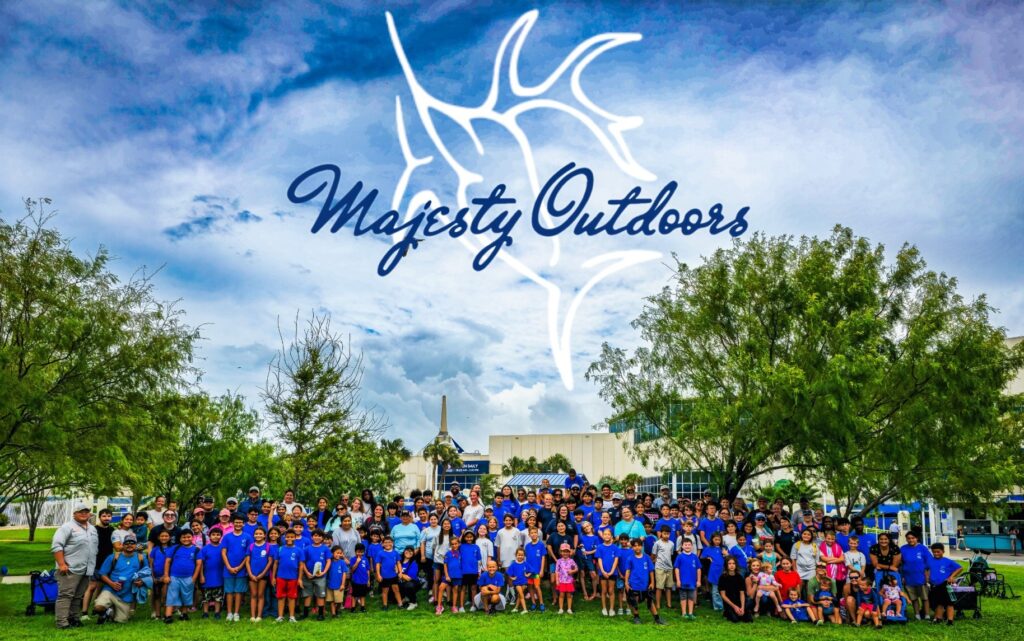
The Majesty Outdoors TideChanger Program is a transformative youth mentorship initiative that supports fatherless youth through ethical hunting, fishing, and a deep respect for the outdoors. Through hands-on experiences, participants gain life skills, character development, and a commitment to environmental stewardship. The program uniquely combines mentorship with conservation, encouraging youth to practice responsibility, sustainability, and care for both land and water. By connecting real-world outdoor education with daily life, TideChanger helps participants grow into responsible community leaders who value the Coastal Bend’s natural resources.
The program operates through five active chapters, each of which leads community outreach projects once per quarter. TideChangers regularly participate in beach cleanups on Padre Island and North Beach, both independently and in partnership with local efforts. These cleanups address litter left by visitors and debris washed ashore by tides. Youth learn to clean up after themselves, understand the impact of pollution, and become good stewards of the environment.
Currently, the program educates over 100 youth every week in conservation, outdoor appreciation, and ethical practices. This investment promotes long-term sustainability, as participants carry forward these values and influence future generations.
Majesty Outdoors also addresses the broader issue of the fatherless epidemic, providing positive role models through structured outdoor mentorship. In partnership with Texas Parks and Wildlife, all participants are required to complete a Hunter Safety Course before taking part in any hunting trips. This ensures they understand safety, conservation ethics, and the importance of natural resource stewardship.
By merging conservation, mentorship, and outdoor education, the TideChanger Program builds stronger youth and healthier communities—making a lasting impact on both lives and the environment.
Student Rising Star – K-12 – Olivia Ruizicka, Flour Bluff High School
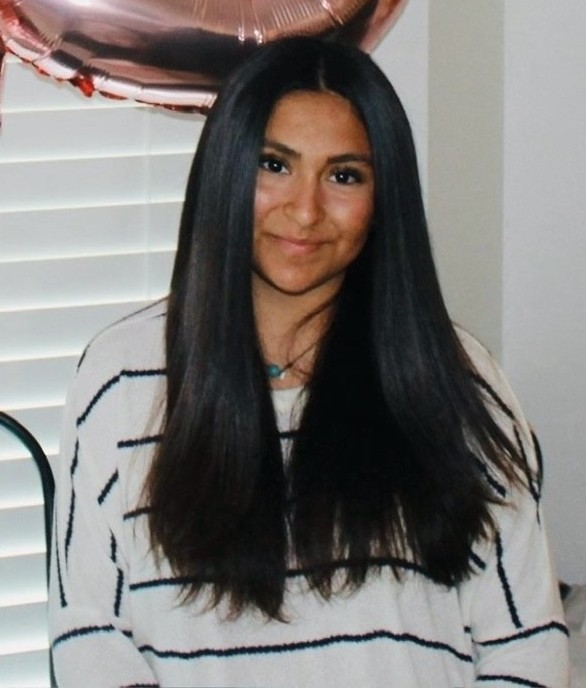
Olivia Ruizicka has played a pivotal role in advancing environmental and community initiatives across the Coastal Bend, focusing on marine science education, hands-on research, and student leadership. Her environmental journey began with a groundbreaking internship through a partnership between Flour Bluff ISD and Texas A&M University–Corpus Christi (TAMUCC), where she worked in Dr. Lin’s marine research lab. As an eighth grader, she joined graduate students in monthly 6:30 a.m. excursions to collect and analyze marine samples such as plankton, sargassum, tar, and water. This project not only expanded her knowledge of marine microbiology but also positioned her as a role model for students pursuing STEM, a core goal of the program.
Beyond research, Olivia transformed her learning into educational outreach. Over the past year, she has led field-based lessons during elementary and middle school field trips, covering topics like kayaking, wetland ecology, marine dissections, and conservation practices. Her ability to break down complex concepts for younger audiences has made marine science more accessible and engaging, especially for students with limited exposure to these ecosystems.
Her leadership extended further with the founding of her high school’s student-led Oceans Club, inspired by her participation in the Gulf of Mexico Youth Climate Summit. Though her initial project proposal wasn’t accepted, her persistence earned her a place at the summit, which motivated her to launch the club. She has since secured a faculty sponsor, recruited members, and obtained funding to support peer-driven marine advocacy and education.
Through research, teaching, and youth engagement, Olivia has created lasting impact in both scientific and community spaces. Her work bridges environmental science with public outreach, empowering her peers and younger students to understand and protect the Coastal Bend’s marine ecosystems.
Student Rising Star – Higher Education – Leeya Flores, Texas A&M Kingsville
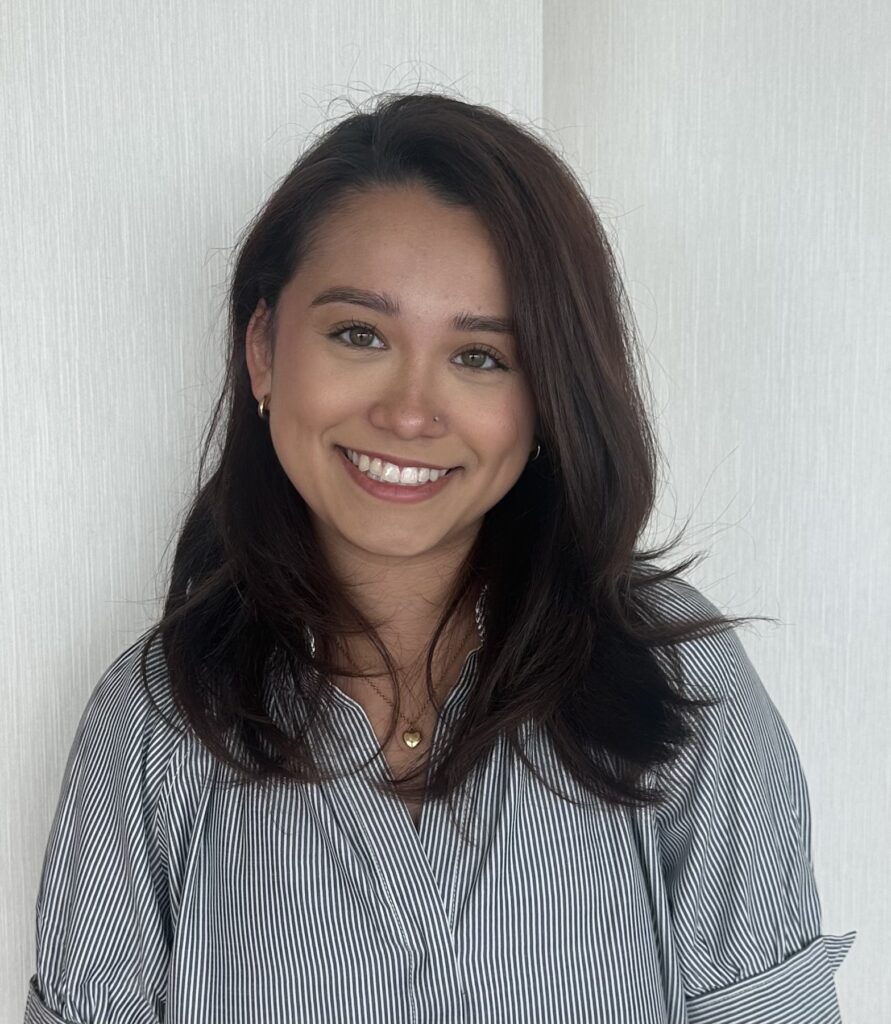
Leeya Flores has conducted impactful research on water quality perspectives among water resource managers and stakeholders in the Southern Coastal Bend, Texas. Her initial project explored how South Texas residents perceive the safety, accessibility, and trustworthiness of their water sources. Through over 20 structured interviews across multiple towns, representing more than 150 residents indirectly, Leeya uncovered a significant disconnect between technical water quality standards and the everyday experiences of families relying on aging infrastructure, well water, or facing frequent boil water notices. Her findings highlighted the urgent need for clearer communication, infrastructure improvements, and inclusive environmental policies, and were presented at several academic venues including the McNair Scholars Symposium and a statewide undergraduate research showcase.
Building on these insights, Leeya’s current research addresses the impact of climate change on coastal water salinity and freshwater access in the Texas Coastal Bend. She analyzes 15+ years of regional water quality data, along with legal and policy frameworks, to understand how sea-level rise, drought, and industrial development are altering water availability in vulnerable areas. This project aims to inform sustainable solutions that protect both ecosystems and communities, offering actionable insights for local agencies and policymakers. Leeya is fostering partnerships with academic mentors, water boards, and policy organizations to ensure her work sparks meaningful change and builds a pipeline of future researchers through mentoring programs at her university.
Throughout her work, Leeya has prioritized community engagement, overcoming institutional distrust by emphasizing transparency and active listening. Her research and leadership roles have raised awareness about water access and climate resilience in underserved South Texas communities. Driven by a passion for education and justice, Leeya aspires to become an environmental and public interest lawyer, using law to hold polluters accountable and shape equitable, sustainable policies at state and national levels.
President’s Award – Teresa A. Carrillo
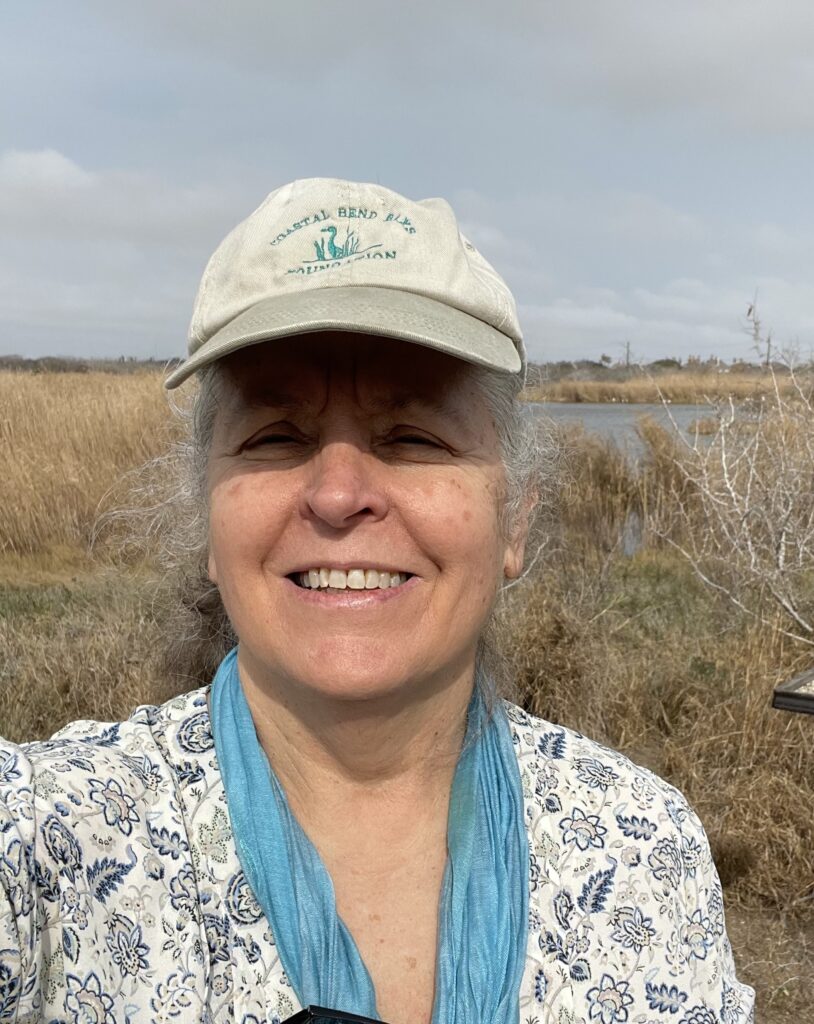
Teresa Carrillo was selected to be CBBF’s Executive Director in 1999 thanks to the recommendation of former ED Jennifer Lorenz and Teresa’s time and activity as a board and committee member. The next several years were both exhilarating and challenging as the organization amped up its efforts to reach a broader range of the public with new and interactive programs.
Modernizing CBBF became a top priority for Teresa. By partnering with TAMUCC, CBBF acquired its first website, which gave the organization an online presence. Staff were also provided with secure email services, greatly improving individual and mass communications. Another boost came when President Patrick McGloin answered the call and found CBBF free office space!
In August 1999 Hurricane Brett roared across Padre Island National Seashore with a direct hit. Teresa invited the new Park Superintendent to give a presentation on the hurricane’s aftermath at the upcoming monthly meeting. It was at this meeting that the name “Coastal Issues Forum” was unveiled. Notable early CIFs included the Coastal Bend Environmental Summits (I, II, and III) and the Oso Watershed Development Model.
The next major program CBBF initiated was Earth Day – Bay Day. Partnering with the Coastal Bend Bays and Estuaries Program, CBBF’s FREE FAMILY FUN event was born. Area environmental, nature, and outdoor not-for-profit organizations were invited to participate for free. Additionally, educators were invited to bring students. The first event, held at Hazel Bazemore Park, was planned and staffed by CBBF volunteers, and funded by CBBEP, grantors, and donors. Earth Day Bay Day has grown in size and scope each year since.
More programs, projects, and activities followed, thanks to grants from federal and state agencies, CBBEP, local industry and businesses, and generous donors. Projects included the Coastal Bend Photo Safaris, Adopt A Beach cleanups, two EPA Superfund grants, as well as the official launch of the Coastal Bend Land Trust and the Coastal Bend Wildlife Photo Contest, both of which went on to become stand-alone non-profits.
For more than 20 years the Environmental Awards Banquet has been the jewel in CBBF’s programs crown. EAB was started with the simple idea that individuals and institutions striving to protect our environment deserve recognition. With this program Teresa sought to inspire organizations and the public at large to do their part to protect mother nature. The first EAB blue ribbon selection committee was chaired by Dr. Wes Tunnell, who was also honored with an EAB award for a lifetime of service to his students, the public and the environment. It was CBBF President Maggie Dalthorp’s time and talent that were the magic sauce that brought EAB to life.
Since the start of CBBF, a cornerstone of its success has been the hard work of board members and volunteers. Teresa was blessed to have the generous support and guidance of CBBF presidents Jennifer Smith Engle, Dave Sullivan, Patrick McGloin, Paul Swacina, Maggie Dalthorp, and Tim Matthews, as well as board directors Bob Wallace, Wes Tunnell, Pat Suter, Senator Carlos Truan, among many others. Jennifer Lorenz, Lois Huff, and Carole Lay made it all possible.
After leaving CBBF Teresa served on the TAMUCC Center for Coastal Studies team that created the Corpus Christi Regional Water Quality Implementation Plan, now under the direction of the Coastal Bend Council of Governments. With a career spanning public health, biological research, fish and wildlife biology, nonprofit leadership and academia, Teresa retired to focus on managing the family ranch, playing with grandchildren, and having fun birding!
Offered with sincere thanks to those who have made all of CBBF’s success possible. Hats off to you!
Legacy Award – Mary Kay Skoruppa
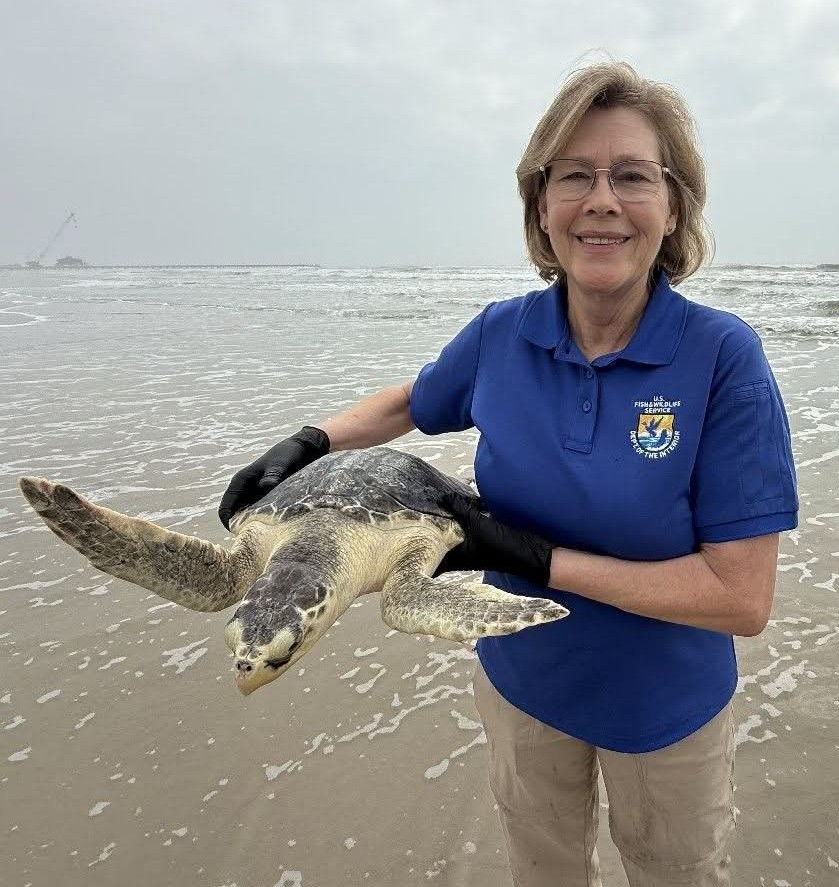
Mary Kay Skoruppa was raised in the Texas Hill Country but came to the Coastal Bend at a young age and has worked as a biologist throughout South Texas for the last 35 years. She is proud to have served our country and community as a federal employee for the U.S. Geological Survey and currently for the U.S. Fish and Wildlife Service. She has also had the honor to work for Naismith Engineering, Hanson Professional Services, and Vega Environmental. In all her work settings, she has loved studying and conserving the unique and diverse habitats of South Texas, including Tamaulipan thornscrub, riparian woodlands, coastal prairie, estuarine and freshwater wetlands, and the Gulf beach.
Mary Kay has published 32 scientific papers, and her work has contributed to our knowledge and management of many species of migratory birds such as the western burrowing owl, long-billed curlew, and redhead duck, as well as documenting range extensions of some resident breeding species such as the Morelet’s seedeater. Her expertise has contributed to the conservation of threatened, endangered, and candidate species under the Endangered Species Act, including the red-crowned parrot, cactus ferruginous pygmy-owl, prostrate milkweed, star cactus, northern aplomado falcon, and all species of sea turtles, especially Texas’ state sea turtle, the Kemp’s ridley.
Mary Kay serves as the U.S. Fish and Wildlife Service’s Sea Turtle Coordinator for Texas and works closely with Padre Island National Seashore and NOAA Fisheries to provide guidance to sea turtle partners throughout the state for nest protection, rescue, and rehabilitation of sea turtles. Especially rewarding to Mary Kay is her work with the oil and gas industry, Port of Corpus Christi, City of Corpus Christi, Nueces County, and many other industry and community leaders to collaborate on moving projects forward in the least environmentally damaging way.
Over the years, when Mary Kay was not advocating for the Coastal Bend’s natural resources, she helped lead the Banquete Scouting America troop, conducted oral history interviews of WWII veterans for the Library of Congress, and organized the search for a cannon lost at the bottom of the Nueces River during an 1835 Texas Revolution battle in San Patricio.
CONGRATULATIONS!!!
